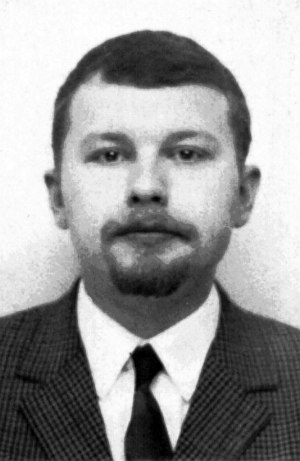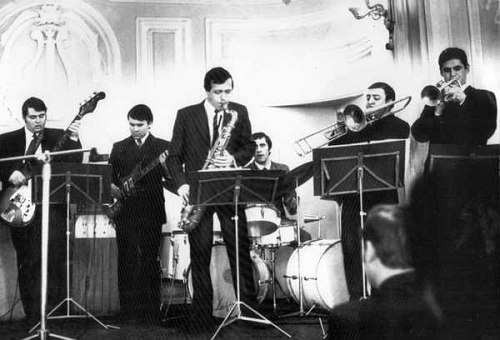|
Trumpeter, composer and ex-member of Vitaly Kleynot's band,
first jazz rock band in Russia, Oleg Stepurko remembers his bandmate,
pianist Grigory Shabrov, who passed away after prolonged illness on
December 2, 2010.
 Jazz
pianist Grigory Shabrov became known as a member of a
sensational jazz rock group led by saxophonist Vitaly Kleynot.
In early 1970s, Kleynot's group played at the Molodyozhnoe, the
premiere Moscow jazz cafe to date, and Grigory joined it after serving
his mandatory term in the army, replacing Valery Kotelnikov and
Viktor Fridman who played in Kleynot's group alternatively
while working as full-time scientists. At that time, Kleynot was to be
the first musician in Moscow to start experimenting with jazz rock
fusion, and Shabrov's talent of a composer turned out to be useful for
him. Jazz
pianist Grigory Shabrov became known as a member of a
sensational jazz rock group led by saxophonist Vitaly Kleynot.
In early 1970s, Kleynot's group played at the Molodyozhnoe, the
premiere Moscow jazz cafe to date, and Grigory joined it after serving
his mandatory term in the army, replacing Valery Kotelnikov and
Viktor Fridman who played in Kleynot's group alternatively
while working as full-time scientists. At that time, Kleynot was to be
the first musician in Moscow to start experimenting with jazz rock
fusion, and Shabrov's talent of a composer turned out to be useful for
him.
In the 60s, Molodyozhnoye cafe on Gorky Street was the
gathering spot for mainstream jazz musicians, but in early 70s, when
jazz rock absorbed the interests of Moscow jazzmen, the brand number
one was handed over to Vitaly Kleytnot's jazz rock band. It consisted
of seven performers, just like their American model group, Chicago:
wind section (trumpet, saxophone, trombone) and rhythm section —
organ, guitar, bass guitar and drums.
Their first performance on Moscow jazz festival at Udarnik
cinema theater was a huge success.
Jazz rock as a genre was such a revolution that it completely changed
the idioms of jazz — the swing, harmony, and melody. It changed the
repertoire as well, from mainstream jazz evergreen standards to
originals, and no one in the Soviet Union was ready for this change.
The author of Kleynot's band music was at first the bassist, Ivan
Vasenin (who in 1977 died tragically in the Hotel Rossiya fire),
who later was replaced as the group's composer by bassist Leonid
Plavinskiy, pianist Shabrov and trombonist Isaya Kofman.
It was Shabrov's song that provoked a scandalous riot during an
audition at MOMA (organization that unionized and
‘ideologically controlled’ all club and restaurant music performers —
Moscow Association of Music Ensembles). Kleynot decided to play "The
Song of Joy," by Grigory Shabrov, which had a similar structure
to Chicago’s pieces — an introduction followed by a jazz ballad
and a jazz waltz closing with funk blues. Shabrov had written a
fantastic music piece which was melodically strong and had beautiful
harmonic changes. Moreover, it also included a lot of live orchestral
inserts, when during the rehearsal musicians randomly changed the
harmony, stretched or shortened some parts of even didn't play them at
all. Then came Vitaly's sax solo as a conclusion — it launched as a
rocket and floated in the outer spaces. One riff was repeated in the
coda, on which the trombone was playing fills in an incredibly high
register, and drums infused with virtuosic breaks. Like in The
Beatles’ "Hey Jude," coda in "The Song of Joy" rose
repetitiously higher and higher, like an ocean wave, reaching the
ninth-wave peak, and crashed into the listeners with emotions and
musical energy.
Oleg Stepurko remembers that when the sound of the last note vanished,
something extraordinary happened — the audience arose in a standing
ovation, and the cheering, whistling, applauding lasted unbelievably
long — 40 minutes!
There were three other bands scheduled for audition after Kleynot's
band, recalls Oleg, and the committee asked the audience to calm down
so that they could move on, but there was no question of that! The
crowd (which largely consisted of Muscovite musicians) was chanting
violently — "Bravo!" The committee members lost their temper
calling them to order. Finally they decided to postpone the audition
till the next day and left, but it stopped no one — everyone was
screaming with frenzy.
In Stepurko's opinion, it's reasonable to suggest that the musicians
not only welcomed the music but strove to show rejection of
totalitarian system this way — the system that oppressed jazz as a
mean of free self-expression. However, this happened only once in
Moscow's jazz history.
The same furore stirred up in Yaroslavl (standing ovation for 20
minutes) and on Kaunas Jazz Festival in Lithuania (then one of the
Soviet republics) — the entire stadium rushed to the stage and started
to jump and throw their belongings in the air — caps, jackets... The
musicians were afraid that the crowd would tear them apart.
Trumpeter Andrey Tovmasian, who later joined to Kleynot's band
to replace Oleg Stepurko, described Grigory as an ‘impeccable jazz
pianist with a wonderful feeling of harmony’. "The soloist always
feels comfortable with Grisha, who always knows how to follow him in
accompaniment and what to press on the keyboard," wrote Tovmasyan in
his yet-to-be-published memoirs.
Shabrov was fearless in composition, remembers Oleg Stepurko,
inventing new harmonies, keys and intonations in jazz. Musicians would
never get used to his Ballad in A major, for it's a key more
typical for rock rather than jazz.
After Kleynot's group broke up, Shabrov, recommended by Tovmasian,
joined the oldest Soviet jazz big band, the Oleg Lundstrem
Orchestra. He used to play in various jazz bands as well, but soon
the disease made him unable to play music. During almost 20 years he
didn't perform at all. This is why his name is practically unknown to
the younger generation of Russian jazzmen.
Grigory Shabrov was one one of the jazz heroes who stood for jazz at
those stern times when jazz was prohibited, and handed on the torch to
the new generation.

Vitaly Kleinot (center) and his band, 1971
Audio: "Vitaly Kleynot's band "The Song of Joy" (G. Shabrov)
mp3 128 kbps, 13 Mb
recorded by Soviet radio, 1972 (producer: Arkady Petrov)
Vitaly Kleynot (tenor saxophone), Isaya Kofman (valve trombone), Oleg
Stepurko (trumpet), Grigory Shabrov (piano, organ), Victor Matsuyev
(guitar), Leonid Plavinsky (bass guitar), Mikhail Branzburg (drums)
This recording was saved by a miracle and is part of the collection of
the first soviet jazz radio announcer, Arkady Petrov. Arkady hosted "Radioclub
Metronome," a program on the waves of the Soviet State Radio, and had
a chance to record the best Soviet jazz bands from mid-60s to early
70s. Moreover, when in 1973 the program was closed by the new, more
reactionary chief of the Soviet radio, Petrov managed to do the
impossible — he snatched the precious archive tapes from the Radio
Center building, and donated them to the archive of Gnessins State
Music College. Arkady Petrov passed away in 2007, but the tapes were
saved, this time from the decay and destruction: on the initiative of
Oleg Stepurko who taught jazz trumpet at the College, the College
president, Irina Kazunina, sponsored the digitalization and mastering
of the recordings, which was timely done by college studio's sound
director, Yan Alikian.
|